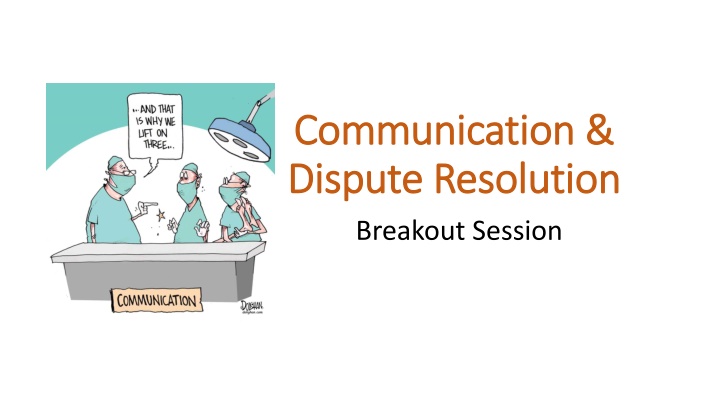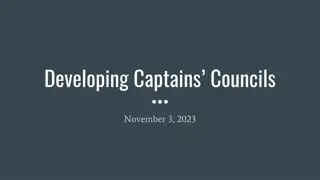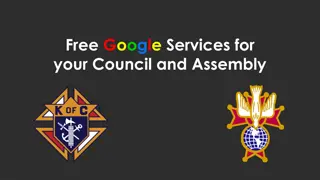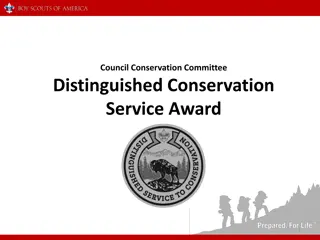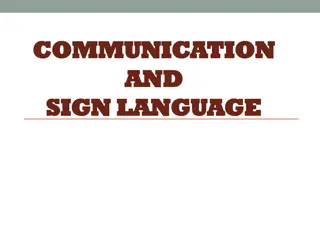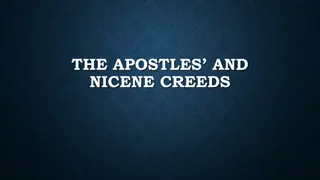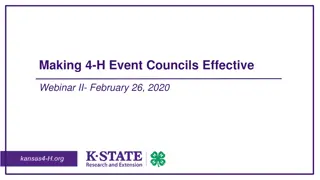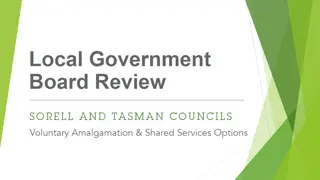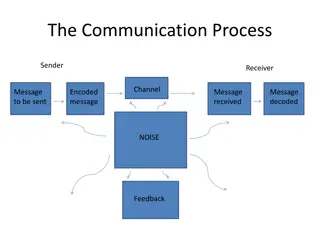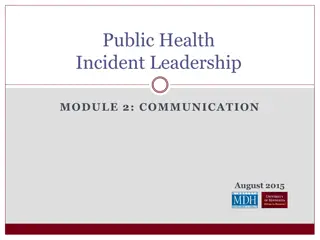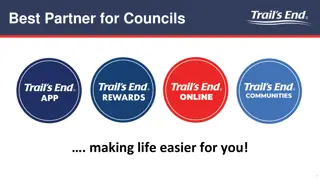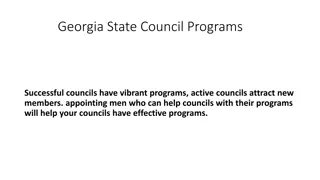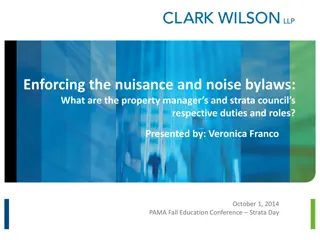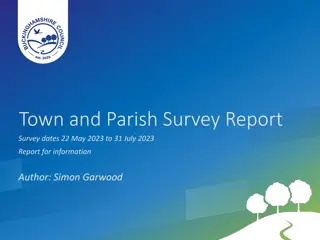Effective Communication Strategies for School Councils
School councils play a crucial role in engaging and communicating with the school community. This content emphasizes the importance of communication within a school council, detailing why communication is essential, what needs to be communicated, how to effectively communicate, and strategies to raise awareness. It highlights the significance of clear and open communication in ensuring the school community feels included and informed. The content also provides practical tips on involving the school community in decision-making processes and networking with other councils.
Download Presentation

Please find below an Image/Link to download the presentation.
The content on the website is provided AS IS for your information and personal use only. It may not be sold, licensed, or shared on other websites without obtaining consent from the author.If you encounter any issues during the download, it is possible that the publisher has removed the file from their server.
You are allowed to download the files provided on this website for personal or commercial use, subject to the condition that they are used lawfully. All files are the property of their respective owners.
The content on the website is provided AS IS for your information and personal use only. It may not be sold, licensed, or shared on other websites without obtaining consent from the author.
E N D
Presentation Transcript
Communication & Communication & Dispute Resolution Dispute Resolution Breakout Session
Whydo we want to communicate? A school council is representative of parents and others from the broader school community. Important that the school council identify ways and means to check the pulse of the school community and ensure the community s wishes, goals and aspirations. Also important that the work of school council - its advice to the principal on school decisions, the strategies school council uses to enhance school climate and culture, and the ongoing support it gives the principal, staff and students in the school - is shared with the school community. Open and clear communication is essential in helping everyone feel included as part of the school community. One of the keys to an effective school council is the ability of the members to communicate well with each other. A responsibility of a school council is to communicate with the parents of the school community.
What What do we want to communicate? do we want to communicate? Be clear. Be heard. Be effective. Be clear. Be heard. Be effective. What do we want our members and others to know? Different types of information can be communicated in different ways, and often the method of communication determines how well the message is received and understood. Important information includes the purposes and goals of the school council - What does school council do? - Why does it exist? What does the council do day-to-day, month-to-month? events meetings services How can families get involved?
How How do we communicate? do we communicate? Involve the school community in important decisions: - open forums, - newsletters, - surveys, - School / community bulletin boards Share information with other school councils in the area (joint meetings) Network with other school councils and school council associations (AYSCBC / CEAY membership, AGMs, school council conferences) 4
Strategies to raise the profile and Strategies to raise the profile and awareness of your school council awareness of your school council Be present (ie. meetings, events). Create a School Council bulletin board at the school for posting minutes, agendas, contact information, school council initiatives and activities. Invite families to your AGM. Host a barbeque or potluck at the start of school and personally invite parents to attend a School Council meeting to see what it s all about. Include highlights of school council meetings in the school newsletter. Submit letters to the editor regarding a particular initiative of your school council. Make a presentation to town/city council, First Nation government and/or organization Ask for parents input into agenda items prior to meetings. Follow up with information via email about decisions made/topics discussed at the meeting for those who cannot attend. Offer workshops and skill development opportunities; bring in speakers on topics of interest.
Dispute Resolution or Communications Policy The Education Act requires each school council, in consultation with the superintendent and school administration, to establish, review and update a dispute resolution policy (sometimes called a communications policy). All school council members should be familiar with this policy. It sets out the steps required when a parent, guardian or community member wishes to raise a concern. The School Council Dispute Resolution Procedure Policy can be found at https://yukon.ca/en/school-council-dispute-resolution-procedure-policy. This policy provides guidelines for school councils for the development of their own dispute resolution procedures. Each school council may tailor it to meet their needs. The policy includes a flow chart which provides helpful guidance about where parents should direct their concerns and who else they may approach, if not satisfied with the outcome. This type of hierarchy should be included in a school council s dispute resolution/communications policy.
When a reporter calls Members of school council may be called or approached by members of the media about issues that arise during their term. It is important for each school council to ensure it has a procedure for dealing with media enquiries and that all its members understand this procedure. Calls from the media may come in regard to conflicts or problems, as well as exciting or positive developments at the school or in education. Although media interviews may be intimidating, they are an opportunity to present your school council s perspective to the public on issues of importance to your school and school community.
Suggestions to consider Designate one key media spokesperson, often the chair, and a backup person. When speaking to media on behalf of your school council, ensure you are commenting about something that council has discussed and agreed to. The media spokesperson should advise your administration and other school council members of the upcoming interview. Ensure everyone knows that you will be making comments on the council s behalf and what you plan to say. Try to anticipate the questions you may be asked in the interview. Ensure you are well-informed and be ready with what you want to and are able to say on behalf of your school council.
Other Suggestions You may want to consult with school administration or a department superintendent, to make them aware of your intended comments to media and discuss a collaborative approach to the questions. Remember that even when a reporter approaches you informally, for example, in a casual conversation at the grocery store, the reporter may consider your comments as on the record . When a reporter calls, you do not have to do an interview immediately. It is reasonable to ask a reporter what they want to talk about, who else they are speaking to in regard to this story, how did the story idea originate, what kinds of questions they have, and what their deadline is. It is also reasonable to set a time in the near future to do the interview, so that you may speak with the rest of school council or any others you wish to consult with, before doing the interview.
Social Media Social media can be a useful way to communicate and share information. Takes time, effort and care to maintain a positive and respectful social media presence. How you communicate about school council activities on social media should be a decision made by the group as a whole. Any comment you make or share on social media may well be there forever, for all to see. Even if you delete a comment or post, someone may already have taken a screenshot which they may share with others. Any statement you make, even if you stipulate it as personal, may be taken to represent the views of your school council. Members of the public will view these posts, including media. Be aware that social media posts may attract media interest and interview requests.
Social Media Policy for School Councils Responsible Use of Social Media 1. Be responsible. 2. Follow the rules. 3. Be transparent. 4. Respect your audience and colleagues. 5. Add value. 6. Protect the reputation. 7. Be accurate. 8. Do not reveal secrets. 9. Remember the purpose.
Privacy, Confidentiality and Record-keeping The Education Act requires school councils to keep complete records of meetings and to forward a copy to the Department of Education each month. The meeting minutes are considered a public document which could be requested by any member of the public and may be made available upon request. Although school councils are not recognized as a public body in the Access to Information and Protection of Privacy Act (ATIPP), written correspondence sent by letter, email and/or fax to any public body designated under the Act may be subject to the provisions of the Act. This includes giving members of the public a right of access to that record, subject only to limited and specific exceptions as defined in the Act. Section 199 of the Education Act also gives the Minister the authority to investigate any matter, including the records of a school council. Therefore, the school council is required to keep its meeting minutes and financial records in order at all times.
Never doubt that a small group of thoughtful, committed people can change the world. Indeed it is the only thing that ever has. Margaret Meade
